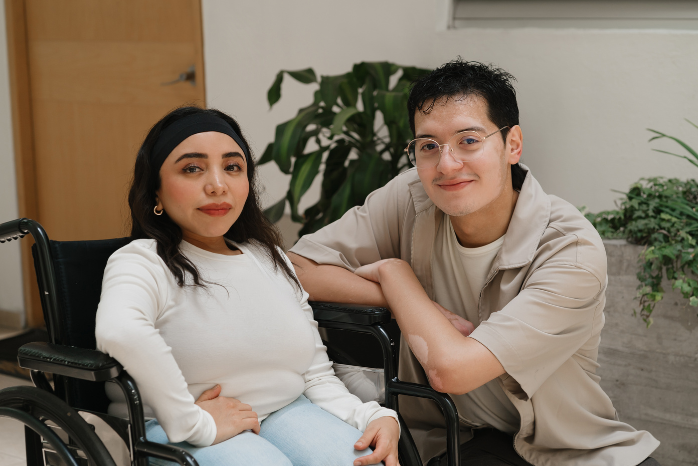
“When check-ins were first introduced, I received an unexpected call from the National Disability Insurance Agency (NDIA) about my brother’s plan. The planner introduced himself, said he wanted to see how everything was going, asked after my brother, and that was it. It was a very casual call – or so I thought.
The issue for us came later, when it became clear that the call we thought was just an informal chat had ended up triggering a new plan for my brother – one that had far less funding than his previous plan and didn’t include the budgets and categories he needed.
My brother still had several months left to go on his current plan, so we weren’t expecting a phone call from the NDIA to suddenly result in a new one being written, especially not one with such a substantial reduction in funding. We really thought the NDIA was just interested in his wellbeing and whether he was accessing all the supports he needed.
My brother has very complex needs and lives in supported accommodation, so the unplanned, unexpected change in his funding had an immediate impact on him and his supports. It had an impact on all of us actually, and it caused a huge amount of stress for our family.
Our ageing parents were really worried about what it all meant. I felt like I’d failed my brother and them by even answering the phone that day – and then again by everyone having to go through a really drawn out and difficult review process, just to get the original level of funding reinstated.”
This is the experience of Anna, who’s a National Disability Insurance Scheme (NDIS) nominee for her brother, Lee.
Maybe you’ve heard a story like theirs before, or maybe it’s similar to your own. But with the NDIA now telling participants to expect check-ins in the future, we want to arm you with the information you need so you can stay in control of your check-in conversations.
To help, we’ve checked out everything the NDIA is currently saying about check-ins, and we went to two experts – Kelly Butler of Focal Community Services and Elizabeth Hickey of AFA Support Coordination – to find out more.
According to the NDIA, a check-in is a phone call or a face-to-face conversation with your ‘my NDIS’ contact – which means a Local Area Coordinator (LAC), Early Childhood Partner (ECP) or NDIA planner. For participants who are unable to join in the conversation – or who can’t participate alone – that’s where their nominee or child representative steps in. Support people are also welcome to join.
The NDIA says check-ins are designed to make sure your plan is working for you, and you have the right supports in place. By understanding your needs and situation, the Agency can help you manage any problems, so you can make the most of your plan.
During a check-in, you might be asked about your wellbeing, if your circumstances have changed, and what is and isn’t working in your plan. Based on that information, the NDIA may:
Elizabeth says check-ins provide an opportunity to review your supports and request different ones if needed.
“The NDIA may ask a participant if they’re happy with the supports they’re receiving, what sort of supports they’re getting, and if things are stable,” says Elizabeth.
Kelly says participants are able to have an appointed advocate present during a check-in, and they or their advocate can voice what the participant needs and wants out of their NDIS plan.
“The planner will, however, deem what’s reasonable and necessary,” says Kelly.
According to the NDIA, if your situation is stable, the Agency will usually check in every 12 months – at least two months before the reassessment date in your plan – to ask you what’s worked and what changes you may need.
Not every participant requires a plan reassessment each year, so be prepared to have a check-in instead.
The NDIA may check in more often if you have big changes coming up that could impact your needs, if you have a complex plan, if you’re relatively new to the NDIS and still on your first plan, or if you’ve asked for more regular check-ins.
Your ‘my NDIS’ contact may also get in touch more frequently if the Agency notices you’re spending more or less money from your plan than is expected, or if you’ve told them about a change in your circumstances. You can also expect to hear from the NDIA if they need to check on your safety – for example, if there’s a natural disaster in your area.
According to the NDIA, you’ll be asked during your planning meeting or plan implementation meeting when you want your first check-in, and a date will be agreed. At the end of each check-in, you’ll agree on a date for your next check-in too.
Elizabeth says participants usually receive an SMS letting them know a couple of hours in advance if an NDIA representative plans to call – and the call typically comes from a private number. She says the phone call may not seem like anything special, but rather like a chat to confirm that things are going ok, that you have supports in place, and you’re happy with the supports you’re receiving.
“Many times, participants don’t even realise it’s a plan check-in unless they ask,” she says.
There are times when check-ins don’t eventuate as expected, and some participants have reported receiving funding cuts or new plans that don’t include the categories of funding they hoped for or needed. That’s what happened to Anna and Lee – and it’s why prior preparation, and confirming if a call from the NDIA is actually a check-in, is vital.
According to the NDIA, about two months before the check-in date you’ve agreed upon, the Agency will contact you and explain what the check-in conversation will cover, how long it will take, and what you need to do to prepare. The NDIA will also let you know if there’s any evidence or information you’ll need to have with you.
The Agency says that, on average, a check-in will take 45 minutes, but this will depend on your situation.
When preparing for a check-in, it’s a good idea to think about whether:
Kelly says when funding is decreased and specific line items are removed off the back of a check-in, this usually occurs due to lack of evidence provided.
She says provider and physician reports and letters of recommendation are key documents she gathers and submits to the NDIA before a scheduled check-in.
“If a participant doesn’t have support coordination, they should be reaching out to their providers and asking for progress reports, and uploading them in their portal to the NDIS,” says Kelly.
Elizabeth echoes the importance of planning.
“Around six months out from the end of your plan, start requesting reports. You can consider if there are any changes to your goals and supports that may need to occur and get justification for these, if needed,” she says. “It doesn’t matter at what point in a plan the check-in occurs – preparation should be the same.”
If a check-in doesn’t go as expected, Kelly says participants, their nominees and support coordinators can ask for an internal review of a decision, which means someone who wasn’t involved in the original decision will have a look at it and check if it’s correct under the law, or if the decision needs to be made again.
According to Elizabeth, the NDIA is expecting a short call to ‘check in’ and the aim is to complete that call at the first attempt. However, a participant or nominee can ask if the call is a check-in and if the Agency is using that call to reassess the participant’s current plan. If it is, they can decline the check-in in favour of a more formal and thorough planning meeting.
On the other hand, if a participant is happy with their current plan and a 12-month roll over suits them, they may decide to have the check-in conversation as soon as possible.
If you decide to defer a check-in discussion until you’re ready and able to have it, according to the NDIA you can ask to end the conversation and reschedule it until you’ve had more time to think, or until you can have a support person with you.
“After that first check-in call, I learned to make sure the providers my brother works with submit regular progress reports and end of plan reports, so we have everything we need when the time comes for a discussion with the NDIA,” says Anna.
“We work as a team with him, his support coordinator and providers to bring together all the evidence he needs for plan-related discussions with the Agency, and we don’t have those discussions until he and we are ready – however long that takes.”
The NDIA has now told every participant to expect them, so learn what they’re about and when they’re likely to happen, and be prepared!
Check-ins can take place every three to six months, depending on the complexity of a plan, if a participant is spending too much or too little of their funding, or if the NDIA thinks a participant’s plan isn’t working for them.
Whether you have a support coordinator or you’re doing it alone, make sure all your providers are on the same page about the supports you need, the evidence you need to provide to the NDIA so it will fund those supports, and the timelines everyone needs to meet in order to provide their documentation to you.
Ask your providers to submit regular progress reports and end of plan reports to bring together all the evidence you need for plan-related discussions with the NDIA.
Be prepared to hear from the NDIA at any time – and know you have the right to ask if the discussion the Agency wants to have is a check-in. Remember, you can defer a telephone discussion until you're ready and able to have it – or you can request a planning meeting. You can also ask for the opportunity to have the right people in the room or on the phone for the discussion, and for time to get together the information you need.
Don’t have a check-in discussion if you’re unprepared, if you don’t have the right people involved, or if you’re not able to give the conversation your full attention. It’s a vital conversation and it’s about you – so don’t feel rushed or distracted.
If you receive a call from the NDIA, ask for a reference number – all interactions with the Agency should have a reference number and you can request this number so you can record it and refer to it at a later date.
For the latest NDIA information about check-ins, click here.


